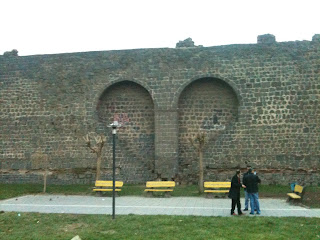14 - 16 December 2012, Dyarbakir,
Turkey
 |
| Barren Landscape on the way to Dyarbakir |
The morning of Friday 14 December I left Bozyazy and hitched for about 800 kilometres till Dyarbakir, one of the most important cities of the so-called Kurdistan. I decided to go there, as my host in Bozyazy recommended me this city for its distinguishing old town center.
On my way aside Mersin, Adana and
Gaziantep I felt that I was yavash yavash moving away from a south-European/Mediterranean place into
a out-and-out Middle-East country. The number of women with headscarf
increased and some men wore the traditional
Arabic headscarf. The music was becoming also more Middle-Eastern than in western Turkey.
The idea was to reach Dyarbakir at the end of the same day but it was
not possible to travel all the way at once. Especially because in this part of Turkey at
five in the afternoon it is completely dark and I do not like to hitch-hike at night.
I
had dinner in a restaurant for truckers on the highway with a Kurd truck-driver
headed to Iraq who was bringing me for some kilometres. Afterwards, I spent the night on a
couch of another restaurant on the highway where he dropped me off.
 |
| View from the top of the wall |
When I left the highway for the county road I realised that the environment was barren - almost desert-like - and strongly reminded me the one of the war in Iraq, which in facts was nearby.
By approaching the outskirts of the city and seeing a number of residential high rises scattered in the desert without any urban development plan I got an unpleasant feeling of ugliness.
Indeed, despite its undisputed historic heritage, Dyarbakir is not particularly beautiful.
The city's historic patrimony is blended with a widespread social wretchedness surrounded by a mixture of poor modernity and rurality.
 |
| Crumbling Buildings just beside the wall (in background) |
These walls are poorly cherished and at some point they run aside crumbling buildings, heaps of rubble and various decaying huts.
However, Dyarbakir - with almost one million inhabitants - is one of the main city in the area and of strategic importance for its geographical position.
 | |||
| The Hearth on the City Wall |
Beside that, Dyarbakir has mainly been famous for the terrorism of PKK - the Kurdistan Workers' Party - and for its worldwide-known prison.
The city did not give me the feeling of a tourist city. I did not encounter any tourist and locals do not speak any English and seem to be unaccustomed to foreigners.
Being a tourists-free city had also some significant pros. For example people are genuinely intrigued by foreigners and do not try to scam too much - as it usually happens in tourist places.
I spent one night in the city, and on the evening of Sunday 16 December, I departed by bus for Trabzon, on the Black Sea.



